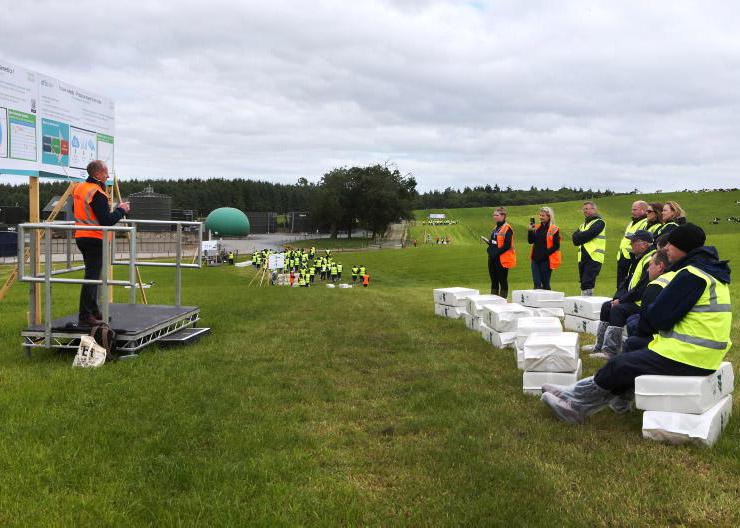Recent extreme weather events have focused attention once again on a problem that will not succumb to hi-tech solutions like vaccination.
The COVID-19 crisis will hopefully end, or at least become less intrusive and more controllable, within a year or two.
The climate crisis will be with us for decades, probably for another 50 years or even 100.
The Intergovernmental Panel on Climate Change (IPCC) will release the first instalment of its Sixth Assessment Report next Monday.
It will sound the alarm once again and remind everyone that the 30 years since the IPCC commenced its work has been wasted.
Since the realisation in the 1990s that net annual emissions would have to be eliminated, they have risen every single year. Concentrations in the atmosphere even rose last year, despite the COVID-19-induced global downturn.
The planet has just one atmosphere and shuffling emissions around, across the 200 or so national territories, is a waste of time
As the European Union has finally acknowledged, developed countries have been outsourcing their carbon emissions to other parts of the world, especially to China, and should take no consolation from the appearance of declining gross emissions in a handful of countries.
The planet has just one atmosphere and shuffling emissions around, across the 200 or so national territories, is a waste of time. China now undertakes a large portion of the emissions formerly released in the importing countries and the EU is finally contemplating a system of border taxes or tariffs to address this distortion. Credit is being taken in countries such as Germany and the United Kingdom for the closure of coal-fired generation stations which helped power the production of goods which are nowadays imported from coal-fired China.
Public agitation will resume once the COVID-19 crisis comes under control, and the recovery will quickly see gross emissions take off again
The world’s leaders are due to renew acquaintance at the COP 26 meeting in Glasgow in November and this latest jamboree could achieve no more than the last, in Paris five years ago, when 40,000 people convened to agree unenforceable targets which have been largely ignored.
Public agitation will resume once the COVID-19 crisis comes under control, and the recovery will quickly see gross emissions take off again.
More conferences will not substitute for actual worldwide interventions and the one certain outcome at Glasgow is a date and venue for COP 27.
The only policy which can possibly stabilise the concentration of greenhouse gases in the atmosphere is reduced consumption, worldwide, of the goods and services which embody these emissions.
To this can be added whatever permanent sequestration of emissions that can be achieved through storage, including storage in the natural environment.
Since all are produced somewhere on the planet, restraining consumption is what matters and production will locate wherever is most efficient
Temporary storage, for example felling trees to be burnt in power stations, does not qualify.
Permanent storage can have only a supplementary role and consumption of carbon-intensive goods and services needs to be constrained, and in the consuming countries.
Since all are produced somewhere on the planet, restraining consumption is what matters and production will locate wherever is most efficient. If the correct carbon price is applied, these location decisions will also be carbon efficient. This points inexorably towards a universal carbon tax and there are signs that some policymakers are coming round to this approach.
The European Commission, for example, has finally brought forward proposals to levy a tax on aviation fuel, hitherto exempt.
Through the 30 years of inaction, the world economy has accumulated a large stock of stranded assets, or rather of assets which ought now to be retired
The most pernicious component of climate denialism is not the attribution of visible change to implausible causes. The IPCC report on Monday will once again summarise the evidence that climate change is real and that time is running out. The pretence that painless solutions are on offer does more damage.
Through the 30 years of inaction, the world economy has accumulated a large stock of stranded assets, or rather of assets which ought now to be retired before their usable lives are over. These include coal and turf power stations, petrol and diesel vehicles and systems in buildings which use fossil fuels for heating and air conditioning.
Carbon tax
Had there been a carbon tax in place, these investments would have been curtailed and the development of alternatives accelerated. The price of policy failure must now be paid and public acceptance is weakened with every hint that fixing the climate will be cheap and easy.
The temptation to downplay the costs of adjustment is hard for politicians to resist, even for those who accept that carbon taxes are bound to rise. This affects even Green parties around Europe, some of whom peddle fantasies about “green” jobs.
Shifting the trajectory of economic activity in midstream is costly
In Ireland, there is currently much greenwashing nonsense, including assertions that data centres can somehow be powered round the clock with a combination of interruptible wind power and certificates purchased in Scandinavia.
Shifting the trajectory of economic activity in midstream is costly. The evidence is now incontrovertible that failing to do so will be far costlier. The task for policymakers at the Glasgow conference is to identify the measures which will minimise these costs over the medium term and to distribute them as fairly as possible.









SHARING OPTIONS